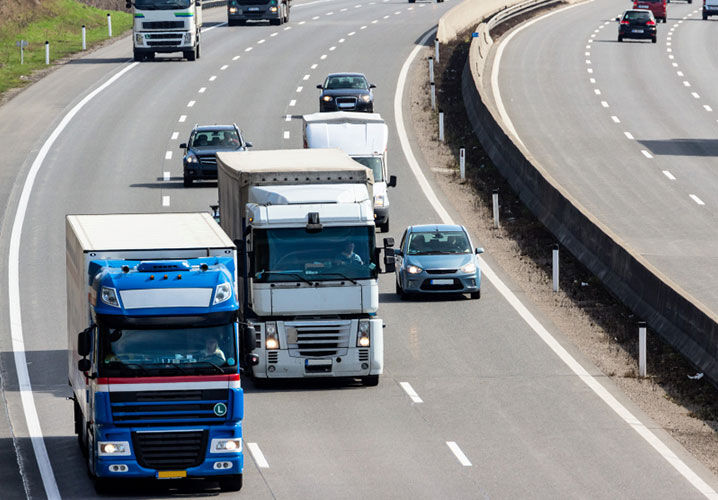
Going separate ways in logistics
Upheaval in the transport sector: the associations of the freight-moving economy and the association of German freight forwarders and logistics operators (DSLV) have not been able to agree on joint general terms and conditions. That has consequences for the insurability of transport loads.
They struggled for two years – and in the end could not reach agreement: the associations of the freight-moving economy on the one hand and the association of German freight forwarders and logistics operators (DSLV) on the other wanted to revise the general German freight-forwarding terms and conditions (ADSp), which had been applicable since 2003. Up to that point, the ADSp represented an arrangement between freight forwarders and shipping agents and formed the basis for their cooperation. Since the start of the year, each of the associations has recommended its own conditions. That means ADSp 2016 for the freight forwarders and the German transport and storage conditions (DTLB) for the shipping agents. As a consequence, when concluding a new contract, it is necessary to agree which conditions should be used. For example, if a food producer wants to have bananas transported from Hamburg port to Munich by lorry, the carrier and food producer have to settle on which conditions apply.
‘The situation since the start of 2016 can be summarised as: “My conditions – your conditions – or simply no conditions”.’
If such an agreement is not reached – which can happen, because in bulk business the issue is often simply overlooked – the law, in this case the German Commercial Code (HGB), automatically comes into action, with a liability of 8.33 special drawing rights per kilogram (approx. 10 euros). However, the HGB deliberately leaves room for differing provisions through general terms and conditions to satisfy the interests of both parties. Section 449, paragraph 2 of the HGB is an example, according to which a deviation within a limit of 2 to 40 special drawing rights from the legal provisions through general terms and conditions is possible, in order to appropriately take into account the weight and value of different goods. Thilo Wandel, Head of the Transport Insurance department at Funk, says: ‘The situation since the start of 2016 can be summarised as: “My conditions – your conditions – or simply no conditions”.' In future, partners need to expressly make reference to the desired terms and conditions to be the basis of a contract in their business documents and correspondence when concluding a contract. At the same time, the business partner’s documents should be carefully checked for the use of potentially different terms and conditions.’ The negotiations between the associations mainly broke down due to an inability to agree on liability conditions.
In brief: DTLB vs. ADSp
DTLB and ADSp 2016 differ in terms of liability, contingency plans and pricing. DTLB puts more pressure on freight forwarders than ADSp does. The area of application of DTLB is restricted to transport and storage contracts and does not include freight-forwarding contracts. That means DTLB only has limited application for shipping agents from the outset.
Uncertainty around liability issues
When it comes to the insurability of transport loads, this lack of agreement primarily means a change in liability. For example, ADSp 2016 increases the liability amount of freight forwarders for damage to goods. Whereas previously ADSp foresaw a liability amount of 5 euros per kilo for damage to goods in custody of the freight company, that figure is now around 10 euros per kilo. For storage contracts, the maximum liability for cases of damages when using the new ADSp has increased as much as five times – from 5,000 euros to 25,000 euros. Other new developments, in addition to adjustments to fit legal changes and developments in case law that have occurred in the meantime, affect delay charges, pallet exchange, contingency plans and pricing. For freight forwarders, that raises the question of whether and to what extent they are insured. Thilo Wandel: ‘For existing carrier’s liability policies, we have been able to agree with most insurers that the liability is insured for both ADSp 2003 and ADSp 2016. However, generally speaking, our freight-forwarding clients should – as before – talk to us if they want to agree a different framework to ADSp 2003 or 2016.’ If this is adhered to, Wandel says, nothing will initially change in practice. However, he adds that there is potential for insurance premiums for freight forwarders to increase because the liability with agreements involving the new ADSp is higher. On the other hand, the new provision could mean lower transport insurance premiums for shipping agents, as the claims burden for them should be reduced.
‘The transport business has become a bit more complicated and less clear,’ says Thilo Wandel. ‘However, we can assume that in the medium term one of the new regulations – DTLB or ADSp 2016 – will establish itself. But we cannot rule out the idea that the shipping business and logistics associations will in fact reach agreement on joint conditions and the cards will be shuffled once more. Until then, it is important to pay close attention to who is working with which conditions and what that means for insurance.’
01/05/2020


